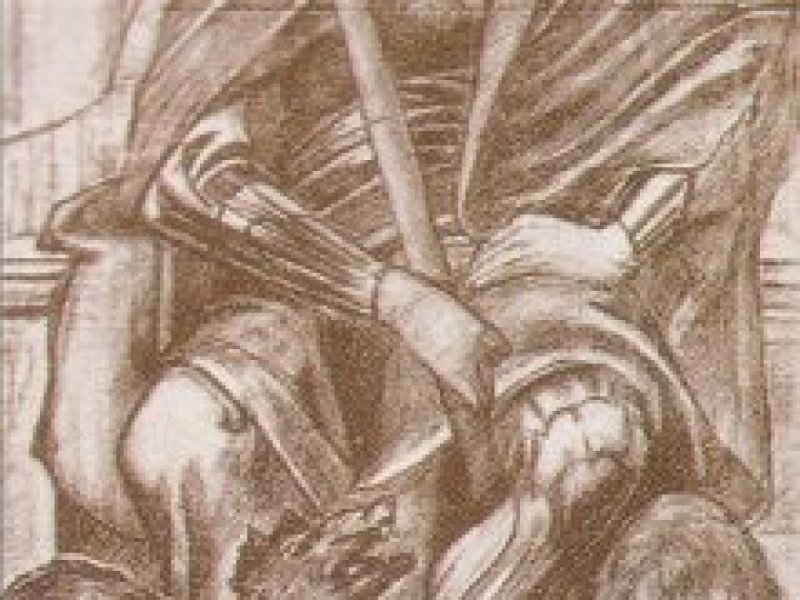Thor
God of thunder and lightning. Thor was the son of Odin and the giantess Jörd (Jord), Fjörgyn (Fjorgyn) or Hlódyn (goddess of the earth). In the Harbaardzljod from the Poetic Edda, Thor told Harbard (Odin in disguise as a ferryman) that he had a brother named Meili.
Thor married Sif, the golden-haired goddess. He was the father of a daughter named Thrud. By his mistress Jarnsaxa (Iarnsaxa, "iron-sax"), a giantess, he was the father of two sons, Magni and Modi.
His domain was Thrudvangar with 540 apartments. Thor had a hall in which he resided called Bilskirnir. His symbol was the device known as the swastika. Thor had a chariot drawn by two goats – Tanngniost and Tanngrisnir. Thor became known as Oku-Thor.
Thor also had two servants, Thialfi and Roskva, son and daughter of a farmer named Egil who had given hospitality to Thor and Loki. See Fighting Illusions. Thialfi appeared frequently, including in the myth about Hrungnir; see Giant of Clay.
Thor was always depicted as a massive and strong, bearded man with his mighty war-hammer Mjollnir that he could use to create thunderbolts. The Mjollnir was a powerful weapon which was used by throwing the hammer at his enemy. The hammer would always return magically to his hands, probably because he wore magical iron gloves, known as the Járngreipr. The twin dwarfs, Brokk and Eiti, created the Mjollnir.
What made Thor seemingly invincible was that he also wore the Megingjarpar (girdle of might), that added to his already enormous strength. This girdle was given to Thor by the giantess Grid, when the giant Gerrod stole Mjollnir. Grid also gave Thor a pair of iron gloves (Járngreipr) and an unbreakable staff known as Grídarvöl.
Thor was the mightiest of the gods, and he was their greatest champion. His chief enemies were the giants from Jötunheim (Jotunheim). Often the stories of Thor were concerned with the god killing one giant or another in various adventures.
Thor was also renowned for his great appetite. (See Thrym for the amusing story of when he lost Mjollnir and disguised himself as the goddess Freyja to retrieve the hammer from the giants.)
You will find many of Thor's adventures in the page titled Of Thor and Giants.
His greatest enemy was called Jörmungand (Jormungand) or Jörmungandr, commonly known as the Midgard Serpent (World Serpent). He failed to kill Jörmungand in an early encounter (see Fishing Expedition in Of Thor and Giants). During the final battle of the gods (Ragnarök), Thor and Jörmungand would kill one another.
Thor enjoyed greater popularity than Odin did, particularly in rural areas. And since he was the god of thunderstorms, he was similar to the Roman god Jupiter or Jove (Zeus). Thursday was named after Thor or Thunor, matching Jove's day.
Snorri made a strange comparison, identifying Thor with Hector, the Trojan hero. Just as Hector was the champion of the Trojans, Thor was the champion of the Aesir.
Related Information
Name
Thor, þórr (Norse).
Donar (German).
Thunaer, Thunær, Thunor, or Thonar (Saxon).
Asa-Thor ("Thor of the Aesir").
Oku-Thor ("driving-Thor").
Chariot-Tyr ("chariot-god")
Jupiter (Roman).
Hector (Greek/Roman).
other names
Asabrag, Atli, Biorn, Ennilang, Hardveur, Hlorridi, Rym, Sonnung, Vingnir.
Related Articles
See also Donar.
Odin, Fjörgyn, Sif, Freyja, Loki, Thrym.
Gifts of the Dwarves, Fighting Illusions, Giant of Clay, Fishing Expedition, Blushing Bride, Ragnarök.
Wodan, Jupiter.
By Jimmy Joe





